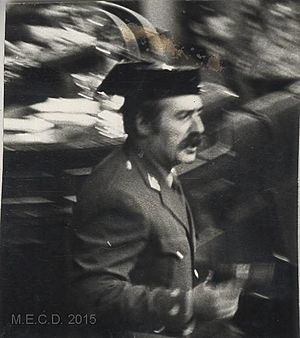Antonio Tejero facts for kids
Quick facts for kids
Antonio Tejero
|
|
|---|---|

Antonio Tejero with a gun in his hand, breaking into the Spanish Congress of Deputies on 23 February 1981 attempting a coup.
|
|
| Born | 30 April 1932 Alhaurín el Grande, Spain |
| Allegiance | |
| Service/ |
|
| Years of service | 1951–1981 |
| Rank | Lieutenant Colonel |
Antonio Tejero Molina, born on April 30, 1932, was a Spanish military officer. He was a lieutenant colonel in the Guardia Civil, which is like a national police force in Spain. He is best known for leading a failed attempt to overthrow the Spanish government on February 23, 1981. This happened during a time when Spain was becoming a democracy after many years of different rule.
Contents
Military Career Highlights
Antonio Tejero joined the Guardia Civil in 1950 as a lieutenant. He worked in different parts of Spain, including Catalonia, Galicia, and the Canary Islands.
Promotions and Transfers
He was promoted to captain in 1958 and then to major in 1963. In 1974, he became a lieutenant colonel. He was in charge of the Guardia Civil in the Basque region of Guipúzcoa. He had to move because he spoke out against the Basque flag, called the Ikurriña.
Early Dissent and Arrest
Tejero was known for his strong opinions. In 1978, he was involved in an attempted coup, which is a sudden, illegal takeover of the government. This event was called Operation Galaxia. He was arrested and spent about seven months in prison for his part in this attempt.
The 1981 Coup Attempt
On February 23, 1981, Antonio Tejero led about 150 members of the Guardia Civil and soldiers into the Congress of Deputies. This is the main building where the Spanish Parliament meets. They held the members of parliament hostage for about 22 hours.
King Juan Carlos I's Response
As the night went on, it became clear that other parts of the army were not joining the coup. Around midnight, King Juan Carlos I spoke to the country on television. He strongly condemned the coup attempt. He told everyone that the law must be followed and that the democratically elected government should continue.
End of the Coup
The next day, the leaders of the coup surrendered. They were arrested by the police. This event was a very important moment for Spain's new democracy.
Life After Prison
After the coup attempt, Tejero was sent to jail. He was the last person involved in the coup to be released from prison. He was set free on December 3, 1996, after serving 15 years.
Later Activities
After his release, Tejero lived in Torre del Mar in the Province of Málaga. In 2006, he wrote to a newspaper, asking for a public vote on new plans for more self-rule in Catalonia. In 2009, his son, Ramón Tejero Díez, wrote to a newspaper. He described his father as a religious man who believed he was doing what was best for Spain.
Recent Years
As of 2018, Tejero was living in Madrid and Torre del Mar. He was working as a painter. In 2019, at 87 years old, he took part in a protest in Madrid. This protest was against moving the remains of Francisco Franco, a former Spanish dictator.
See also
 In Spanish: Antonio Tejero para niños
In Spanish: Antonio Tejero para niños
 | Tommie Smith |
 | Simone Manuel |
 | Shani Davis |
 | Simone Biles |
 | Alice Coachman |

